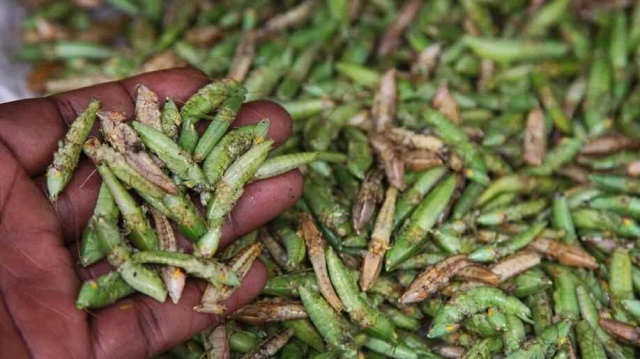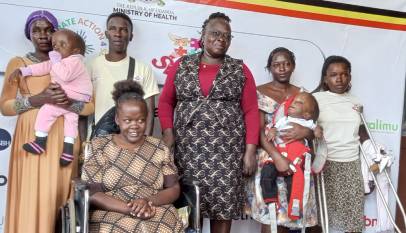UNBS Sets New Standards for ‘Nsenene’ Industry
Uganda National Bureau of Standards (UNBS) and African Organisation for Standardisation (ARSO) have launched 15 African Standards to ensure consumer safety and boost the trade of Grasshoppers (Nsenene) and Edible Insects.
The standards cover the edible insect value chain, from farming and wild harvesting practices to processing, hygiene, packaging, safety, and regulatory frameworks.
The two-day event just ended in Kampala presents a new chapter in the lucrative Edible Insects industry that most African countries, including Uganda, are increasingly exploiting. In Uganda, for example, trading in grasshoppers (Nsenene), a cherished delicacy, remains a lucrative business for several households, especially in the central region.
The Executive Director of Uganda National Bureau of Standards (UNBS), Eng. James Kasigwa noted that standardisation of edible insects is key in ensuring consumer safety, product quality and expansion of markets as well as winning consumer trust.
The standards cover all insects such as grasshoppers, locusts, crickets, bee larvae, dung beetles, termites, white ants and many others, providing a wide scope of products that can be traded everywhere and anywhere.
Eng. Kasigwa explained that the demand for animal protein is on the increase, driven by population, urbanisation and changing dietary patterns, yet the current traditional livestock production systems are not sufficient to meet the demand in a resource-efficient manner, which necessitates an alternative source of protein to supplement the latter.
“Insects now present a promising and under-utilised alternative. They are rich in proteins, vitamins and minerals, require minimal land and water and have significantly lower greenhouse gas emissions,” he said.
Patrick Mugisha, Commissioner for Business Development and Quality Assurance in the Ministry of Trade, Industry and Cooperatives, said standardisation of edible insects will promote competitiveness, expand business opportunities and accelerate the achievement of Uganda’s ambitious strategy of expanding its economy from the current GDP of nearly US$50 billion (as of 2023) to US$500 billion by 2040.
In a speech read by Mugisha, the State Minister for Trade, Gen Wilson Mbadi, said Uganda consumes edible insects as part of its rich cultural heritage and tradition.
He noted that varieties of the edible insects popularly consumed within most ethnic groups in Uganda are commonly the termites and the long-horned grasshoppers, locally called “nsenene”.
“These insects provide protein as a main source, and because of this, they are now being sought for as an alternative protein not only for human consumption but also as a replacement for expensive raw materials in the production of animal feed.
Studies have shown results that proteins in commonly eaten insects range from 35% to 60% which is significant,” he said.
He appreciated ARSO Central Secretariat with the support from the International Centre for Insect Physiology and Ecology (ICIPE) for facilitating the launch of the African standards for edible insects and enhancing capacity to ensure stakeholders implement and apply the standards.
He disclosed that in 2016, Flying Food Uganda supported 39 cricket-rearing centres and at least over 2,000 individual farmers and over 16 community and school-based insect breeding centres are involved in insect farming in Uganda as of January 2025, indicating a growing sector.
Increased trade and consumption of edible insects highlights the growing economic importance and potential for development through entrepreneurship and innovation.
Uganda was one of the pilot countries to develop a standard on edible insects and insects for compounding animal feeds in 2017/2018, which was led by Makerere University and supported by ICIPE, followed by Kenya and Rwanda.
Dr Hermogene Nsengimana, the Secretary General ARSO, challenged member states of ARSO to implement the set standards to boost trade within the African Continental Free Trade Area (AfCFTA).
“When you develop standards and you don’t implement them, they will remain on paper. If they are not implemented, they are nothing,” Dr Nsengimana emphasised. Dr Jimmy Pittchar, Director ICIPE, disclosed that the global market size for edible insect products for food and feed is estimated at $1.35 billion and $1.77 billion.”
This is further projected to grow between $4.38 billion and $ 17.9billion by 2033,” he said. Both ARSO and UNBS pledged to support about 200 small and medium-scale edible insects’ enterprises, to adopt the standards and thrive.
Activists Demand Enforcement of Nutrition Standards to Combat Spina Bifida
TV Actress Maimo Nicole Passes Away
Kiryandongo Hospital Runs out of Beds and Supplies following Road Crash
Dj Rachael Launches Go-fund-me for Cancer Treatment
Lydia Wanyoto Declares Bid for Speaker of 12th Parliament
Minister Stops Catholic Church from Evicting Nsambya Estate Residents
60 Traders Seek Govt Support After Inferno
Lydia Wanyoto Declares Bid for Speaker of 12th Parliament
Lydia Wanyoto, the Mbale City Woman Member of Parliament-elect, has declared her intention…
Now On Air – 88.2 Sanyu Fm
Get Hooked Right Here
DON'T MISS!!!
Warder Kills Three, Injures Three Others at Kiboga Prisons
At least two prison officers and a child have been shot dead at Kiboga Central Prisons. The incident occurred at around 6:30 am on Monday when Moses Anguyo































